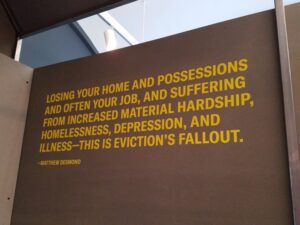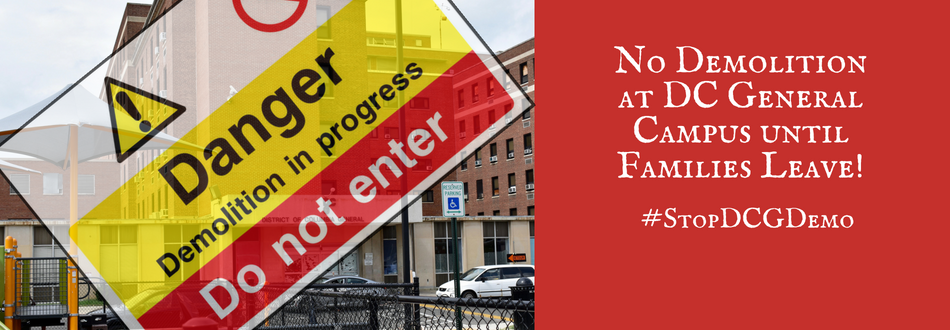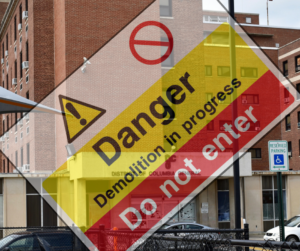Last Thursday, January 17, the DC Housing Authority (DCHA) Board of Commissioners held an emergency meeting to consider Resolution 19-01: “To Adopt a Framework for the Stabilization and Repositioning DCHA’s Portfolio of Properties.” The resolution was drafted in response to the agency’s findings that the vast majority of public housing units are in critical need of repair, 2500 of which are “nearly uninhabitable.”
The resolution proposed to the Board clearly indicated that the agency already had a preferred solution to the problem. In particular the agency asked the Commission to: “Affirm that, in light of the Federal Government’s historic defunding of public housing operating support and capital funding, the most effective, available tools for addressing immediate conditions, and insuring longer term financial and physical viability would involve shifting properties from traditional public housing subsidy… to a voucher (HCVP) funding platform…” (emphasis added).
At the meeting, numerous advocates pushed back on this assumption, and instead advocated that the agency come up with a detailed plan to repair and maintain public housing without losing public housing units. The Commission agreed to amend the resolution to indicate that transitioning to a voucher-based was one option, but not necessarily the “most effective” option, and to require the agency to develop a detailed plan for seeking local money for repairs.
The agency also committed to releasing additional data to the public about its findings and to meeting with advocates and public housing residents to solicit input on the future of DC’s public housing stock. See below for the testimony provided by Legal Clinic attorney Amber Harding at the meeting. We will continue to update you as we learn more.
We agree that public housing is in a serious state of disrepair. I don’t need to tell you how many public housing residents have testified before this very Commission about outstanding work orders and terrible public housing conditions, and how many have gone down to the DC Council to share their stories. This is not a new problem. In fact, we were the lawyers who brought a class action against DCHA in 1992 that put the agency into receivership over its failure to maintain its public housing stock. That receivership lasted until 2000.
We also agree that the federal government has failed to adequately invest in public housing infrastructure. We were there when that disinvestment began, and we partnered with this agency to fill the holes in its operating budget with local dollars (for public safety) at least a dozen years ago. When community organizers like Empower DC began to raise alarms about significant repairs needed in public housing, the Fair Budget Coalition (FBC) advocated for local investments in repairs to public housing. We might have been more successful in that advocacy if DCHA had been as transparent about the crisis as it is being today. Instead, DCHA leadership often claimed that it could make do with much less and, even when it received local money for repairs, had to be heavily pressured to use it to abate health and safety risks.
Now DCHA says it needs $343 million this year to temporarily relocate residents and make needed repairs to 6695 public housing units. That means 84% of the public housing stock is in urgent need of repair. That’s not a problem that develops in a month, a year or even 5 years. That’s gross negligence on a massive, unprecedented scale.
Nevertheless, here we are. After decades of mismanagement, negligence, and ignoring the pleas of public housing residents, the question comes down to: what can be done?
Unfortunately, at an emergency meeting with no opportunity to engage the community, you are being presented with a false choice between leaving thousands of public housing residents in dangerously deplorable conditions and eradicating a large portion of DC’s public housing stock and displacing thousands of households.
You have a better, far more obvious choice. Ask the Mayor and the Council for the funds you need to make these repairs. We’ll support you in that ask. While the amount seems large, it is not unprecedented for DC to invest this kind of money into infrastructure and capital improvements. Just last year, DC chose to increase the sales tax to raise $178.5 million per year in dedicated funding to improve Metro infrastructure. (According to Mayor Bowser: “With this commitment, we will get Metro back to a state of good repair so that Washingtonians have access to a safe and reliable Metro system for years to come.”) DC has also invested $3 billion to modernize and renovate our crumbling public schools. Public housing is just as critical of an infrastructure investment as schools and transportation. DC has the money to do this. In 2017, DC had a surplus of $287 million—extra money DC put into the bank for a rainy day. We don’t yet know the numbers for 2018, but DC is likely to have enough surplus in 2019 to get DCHA most of the towards its needed FY19 expenditures.
It is important that, when developing its options for resolving this crisis, that the DC Housing Authority consider the important and distinct role that public housing plays in DC’s housing ecosystem. Many public housing households could not secure units in the private market that meets their needs whether because there are too few large family units, too few wheelchair accessible units, or too few landlords that accept applicants with poor credit. If 2500 public housing households are forced to use a voucher instead, how many of those households will have to leave DC to secure housing?
We do not support leaving people in uninhabitable apartments or in homes where their health is at risk. But we also cannot support what feels like the death knell for public housing—converting thousands of units to vouchers or redeveloping those properties into places our clients will never be able to return to. We urge you to require DCHA to: 1) develop an option for fully funding the repairs and renovations of all the units without losing any public housing stock and 2) ensure that there is a meaningful input process for public housing residents about the future of their homes. We look forward to working with the agency to develop such a plan and to advocate for its funding.



